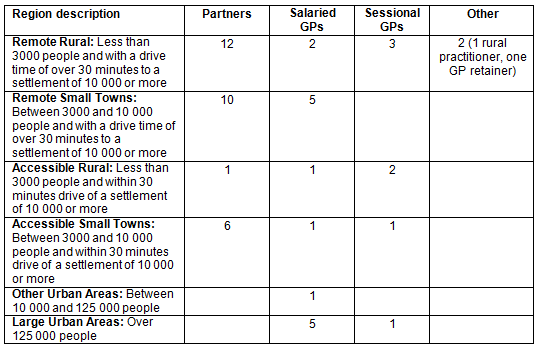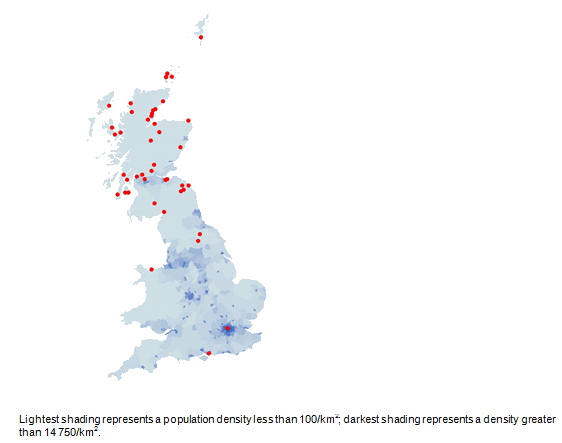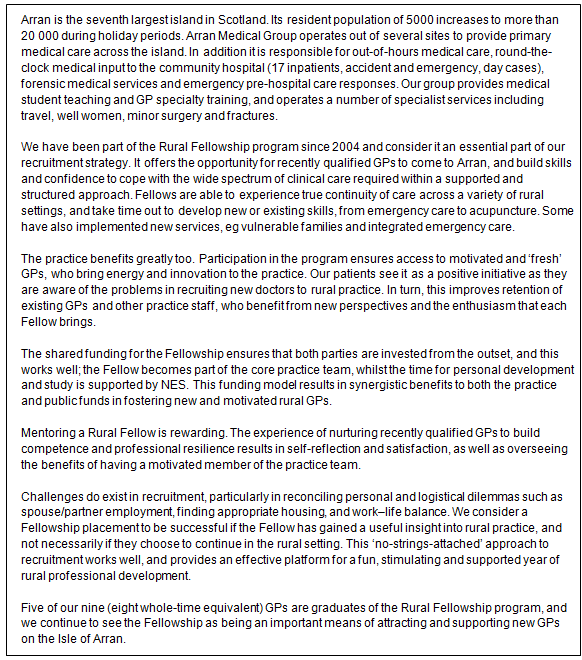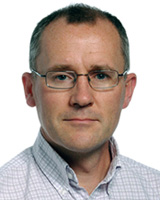In Scotland 20% of the population live in a remote or rural area spread across 94% of the land mass that is defined as remote and rural. The Scottish Government has, in its Quality Strategy, outlined the need for equitable access to high-quality healthcare services for all, regardless of personal characteristics such as gender, ethnicity, geographic location or socioeconomic status1. Meeting the requirement for improved quality of service for patients brings particular challenges in Scotland's remote and rural areas.
Local health services fulfill economic and social roles in rural areas that are fundamental to community viability and resilience. Scotland's remote, rural and island health boards face particular difficulties in sustaining and improving services in line with the Scottish Government's 2020 vision for health and care2. Reasons for this include an ageing population, remoteness from mainland/specialist centres, and the comparatively low socioeconomic position and dispersed rural deprivation of communities. The effects upon both service delivery and many aspects of population health are inextricably linked to the geographic challenges faced.
The history of policy construction and implementation relating to healthcare in rural Scotland is over 150 years old and is summarised in the policy paper Supporting remote and rural healthcare by NHS Education for Scotland (NES)3. While much has changed as a result of these policies, many challenges remain. Issues pertaining to education, training and support have been a constant thread throughout and are cited by professionals currently working in rural areas as considerations when they decide to apply for or remain in remote and rural areas.
While there is some suggestion that exposure to rural practice during undergraduate or postgraduate training increases the chance of a doctor committing to rural practice, there is stronger evidence that recruitment of students from rural areas to medical school will see them return to rural areas4. NES, NHS Scotland's training and education body, works in partnership with territorial health boards and medical schools to address rural recruitment and retention through a variety of initiatives:
- support for rural school pupils in application for medicine5
- a rural-track undergraduate option6
- a rural-track Foundation Programme option7
- a rural-track GP Specialty Training option8-10
- a post-qualification GP Rural Fellowship11
- rural surgical12 medical and anaesthetic fellowships to train the specialist workforce for Scotland's rural general hospitals.
The longest established of these is the GP Rural Fellowship, which has been in place since 2002 and this article describes this program and reports on a survey of the output of the Fellowship from 2002 to 2013.
The GP Rural Fellowship is aimed at newly qualified GPs, who are offered a further year of training in, and exposure to, rural medicine (Box 1).
Two distinct Fellowship options have been available since 2013 (only the 'standard' option was available until then):
- the 'standard' GP Rural Fellowship option based on the curriculum for rural practice developed by the Remote and Rural Training Pathways Group (GP sub-group final report, September 2007)13.
- The GP Acute Care Rural Fellowship option, based on work to define GP acute care competencies following from the agreement of the Framework for the Sustainability of Services and the Medical Workforce in Remote Acute Care Community Hospitals14.
The Fellowship is run as a partnership between NES and participating rural health boards with funding being provided on an approximately 50:50 basis. Health boards' investment in the Fellowship is returned through the service commitment that the Fellows provide. It is a condition of the Fellowship that such service commitment should be in rural environments: rural practices for the 'standard' Rural Fellowship, and rural hospitals for the Acute Care Fellowship. The objective is that the service commitment contributes to the training aspects of the Fellowship and provides experience of rural practice. Fellows are expected to spend approximately half of their time working in these environments.
Fellows are allocated a base practice in the area in which they will be working and are expected to spend approximately a quarter of their year working in this practice. This relates both to the 'standard' Rural Fellowship and to the Acute Care Rural Fellowship; it is crucial that Fellows in the latter group maintain their general practice competencies and experience through the year, despite a focus on gaining acute care competencies. Base practices are chosen for their proven record of good organisation, teamwork and educational support. Each Fellow is allocated a mentor, normally a GP in their base practice for the 'standard' Fellowship or a GP or consultant in the acute care service for the Acute Care Fellowship.
The funding share from NES allows Fellows to have protected educational time to meet their educational needs in relation to rural medicine for the remaining quarter of the year. As fully qualified GPs they are expected to organise their own professional development (attend courses, arrange clinical attachments etc.) based on a personal development plant derived from needs assessment mapped to the relevant curriculum and agreed with the Fellowship coordinator. Individual personal development plans are supported by three 2-day meetings that are organised by the coordinator during the course of the year. The purpose of these meetings is to help Fellows meet learning needs that cannot be easily met by personal study, or are more appropriately delivered to the Fellows as a group. The content of these meetings comprises:
- pre-hospital emergency care
- emergency obstetric and paediatric training and drills
- remote psychiatry and detention procedures
- ear, nose, throat and ophthalmology skills training for remote practice
- dispensing and management of rural practice
- recognition and management of zoonotic illnesses
- rural-specific/rural-dominant health issues
- historical and political context of rural medicine, future resilience
- a forum to discuss challenges, foster peer-support and encourage peer-referencing
All Fellows are expected to undertake a project during their Fellowship year on a relevant topic of their choice.
The Fellowship has grown and undergone several modifications since its inception. The current model involves co-funding arrangements between NES and participating boards supporting a maximum of 12 Fellows per year. Given this level of funding support it is important that the outcome of the fellowship experience is understood, in particular its influence on recruitment to, and retention in general practice in rural Scotland.
To address this need a survey of all previous rural fellows was undertaken in the first quarter of 2014, including all fellows that had undertaken the fellowship in the 11 years from 2002-03 to 2012-13. This survey was of a cumulative number that undertook the Fellowship over several cohorts over the 11 years and looking at their current position at a single point in time. A total of 69 GPs were recruited to the Fellowship in this period. Three were excluded from the survey: one had died, one was never able to engage in the Fellowship for health reasons and subsequently left the profession, and one resigned within a week of commencing the Fellowship.
The remaining 66 Fellows were sent a request to participate in an electronic survey, with several reminders where necessary. The survey questions are shown in Box 2.
There were a total of 65 responses, a response rate of 98%.
Of those who responded, 63 were working currently in general practice (97%). One of the two that were not working in practice reported that they were running a leprosy clinic in Ethiopia. The other is a medical officer in addictions in urban Scotland.
Of the 63 working in general practice, 54 were working in substantive GP roles: partner (33), salaried post (20) or 'rural practitioner'(1) (a substantive GP role staffing an acute rural hospital). This equates to 86% of those working in general practice or 83% of the whole cohort. Eight were working in sessional roles and one as a 'GP retainer'.
Of the 63 working in general practice, 53 (84%) were doing so in Scotland (82% of the whole cohort that responded to the survey are working in general practice in Scotland). Eight were working in the rest of the UK and two in New Zealand.
The distribution amongst six categories of the 53 doctors working in general practice in Scotland is described in Table 1. These working locations are consistent with the Scottish Government's urban rural classification15.
The Scottish Government's urban-rural classification includes definitions of both 'accessible' and 'remote rural'. These include categories 1, 2 and 3 in Table 1. A total of 38 of the 65 Rural Fellowship graduates that responded to the survey were working in rural Scotland (58%), 32 of them in substantive roles (49%). Eight were working in accessible small towns, often with community hospitals, where they were using the skills gained during the Fellowship year. Seven of these eight were working in substantive general practice roles. A total therefore of 46 graduates (71%) were working in rural areas or accessible small towns, 39 (60%) in substantive general practice roles.
Those working in general practice in the UK were asked to provide a postcode; the map in Figure 1 illustrates the current distribution of rural fellowship graduates in the UK on a background of population density.
Box 1: Aims of the GP Rural Fellowship

Box 2: GP Rural Fellowship survey questions

Table 1: Distribution of Fellowship graduates in Scotland


Figure 1: Distribution of rural fellowship graduates currently working in the UK.
Box 3: Case study - Isle of Arran

Scotland's GP Rural Fellowship program represents a successful collaboration between education and service, and the results of the survey reported in this article underline previously unpublished data suggesting that approximately three-quarters of graduates are retained in important roles in rural Scotland. This high-level, broad-brush analysis is complemented by an understanding of the impact that the Fellowship can have in specific locations that may otherwise provide recruitment and retention challenges (Box 3).
It is unclear, however, whether the Fellowship confirms a prior intention to work in rural practice, or whether it provides a new opportunity through protected exposure. This will form the basis of further evaluation.
While a major aim of the Fellowship is to impact on recruitment to and retention in rural practice, the aims also include significant elements of preparation for practice, not only for remote and rural general practice, but also for provision of acute care in remote hospitals. The need for and opportunity to develop a structured approach to the development of competencies for acute care in such settings has been highlighted in the General Medical Council's consultation on the development of 'credentials'16. Further work will be progressed to develop this approach and to evaluate the impact and outcome.
Conflicts of interest
Ronald MacVicar is Postgraduate Dean for the North of Scotland region of NHS Education for Scotland and has overall responsibility for the Rural Fellowship program. Gillian Clarke is the Rural Fellowship Coordinator for NHS Education for Scotland. David Hogg is a Partner in the Arran Medical Group and a graduate of the Rural Fellowship program.
References
1. Scottish Government. The healthcare quality strategy for Scotland. (Internet) 2010. Available: http://www.scotland.gov.uk/Resource/0039/00398674.pdf (Accessed 3 May 2015).
2. Scottish Government. A route map to the 2020 Vision for Health and Social Care. (Internet) 2013. Available: http://www.gov.scot/Resource/0042/00423188.pdf (Accessed 3 May 2015).
3. NHS Education for Scotland. Supporting remote and rural healthcare: A NES Board Paper. (Internet) 2013. Available: http://www.rrheal.scot.nhs.uk/media/185252/remote%20and%20rural%20healthcare%20updated.pdf (Accessed 3 May 2015).
4. World Health Organization. Increasing access to healthcare workers in remote and rural areas through improved retention: global policy recommendations. (Internet) 2010. Available: http://www.searo.who.int/nepal/mediacentre/2010_increasing_access_to_health_workers_in_remote_and_rural_areas.pdf (Accessed 3 May 2015).
5. University of Aberdeen School of Medicine and Dentistry. Rural applicants. (Internet). Available: http://www.abdn.ac.uk/smd/medicine/rural-applicants.php (Accessed 3 May 2015).
6. University of Aberdeen School of Medicine and Dentistry. Remote and rural. Available: http://www.abdn.ac.uk/smd/medicine/remote-rural.php (Accessed 3 May 2015).
7. Scottish Medical Training. Foundation programmes. (Internet). Available: http://www.scotmt.scot.nhs.uk/foundation/foundation-programmes/north.aspx?page=2#programmesList (Accessed 3 May 2015).
8. Scottish Medical Training. General practice training programme descriptor (rural-track). (Internet). Available: http://www.scotmt.scot.nhs.uk/media/279183/programme-descriptor-north-rt-2015.pdf (Accessed 3 May 2015).
9. North of Scotland GP Training. Recruitment blog. (Internet). Available: http://scotlandgptraining.blogspot.co.uk Accessed 3 May 2015).
10. MacVicar R, Siderfin C, Williams C, Douglas J. Training the rural GPs of the future. BMJ Careers. (Internet) 2012. Available: http://careers.bmj.com/careers/advice/view-article.html?id=20006803 (Accessed 3 May 2015).
11. NHS Education for Scotland. GP Fellowships. (Internet). Available: http://www.nes.scot.nhs.uk/education-and-training/by-discipline/medicine/general-practice/gp-fellowships.aspx (Accessed 3 May 2015).
12. Grant AJ, Prince S, Walker KG, McKinley AJ, Sedgwick DM. Rural surgery: a new specialty? BMJ Careers (Internet) 2011. Available: http://careers.bmj.com/careers/advice/view-article.html?id=20004202 (Accessed 3 May 2015).
13. Academy of Medical Royal Colleges and Faculties in Scotland. Remote and Rural Training Pathways Group; final report. (Internet) 2007. Available: http://www.scotland.gov.uk/resource/doc/924/0060540.pdf (Accessed 3 May 2015).
14. NHS Scotland. Framework for the Sustainability of Services and the Medical Workforce in Remote Acute Care Community Hospitals. (Internet) 2011. Available: http://www.nospg.nhsscotland.com/wp-content/uploads/2008/10/Community-Hospital-Framework_FINAL-amended-2104111.pdf (Accessed 3 May 2015).
15. Scottish Government. Urban-rural classification. (Internet). Available: http://www.scotland.gov.uk/Topics/Statistics/About/Methodology/UrbanRuralClassification (Accessed 3 May 2015).
16. General Medical Council. Introducing regulated credentials: consultation on proposed framework. (Internet). Available: http://www.gmc-uk.org/education/continuing_professional_development/27258.asp (Accessed 23 September 2015).


